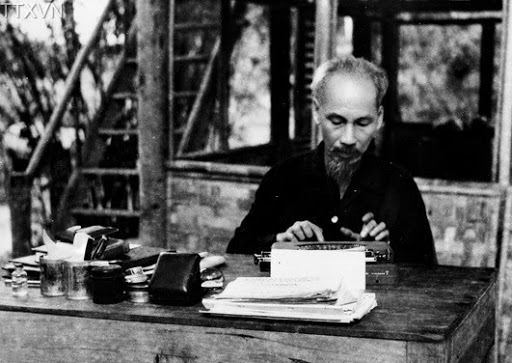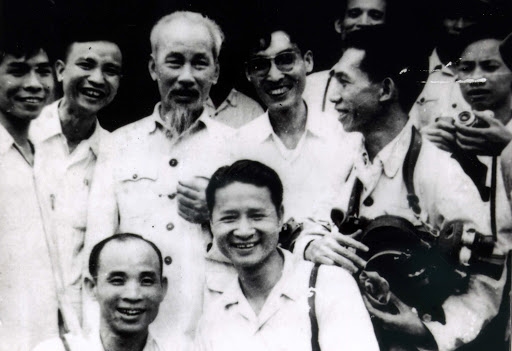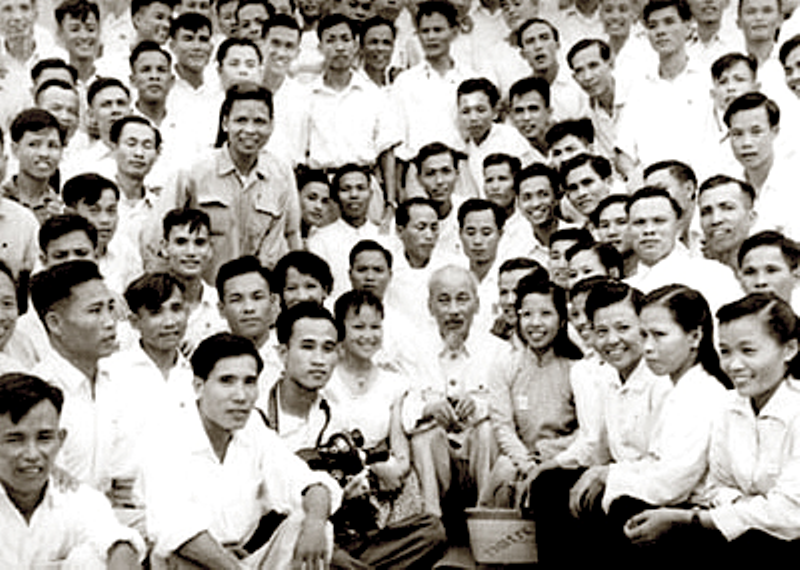Regarding the role and mission of journalism and journalists.

President Ho Chi Minh - the great mentor of Vietnamese revolutionary journalism.
President Ho Chi Minh was a shining example of a revolutionary journalist and a great teacher of Vietnamese revolutionary journalism. Acknowledging his deep connection to journalism, throughout his life of revolutionary activity to save the nation and its people, Uncle Ho used journalism as a sharp weapon to fight the enemy while simultaneously propagating and mobilizing the people for national liberation and socialist revolution. He wrote over 2,000 articles of various genres for more than 50 newspapers and magazines both domestically and internationally, in many languages, expressing revolutionary thought, patriotism, love for the people, and lofty morals. His writing was simple, accessible, and diverse in style, captivating the hearts and minds of hundreds of millions worldwide. Furthermore, his teachings on journalistic work constitute an invaluable treasure trove of revolutionary journalistic theory in Vietnam.
In late 1924, Nguyen Ai Quoc returned to directly lead the Vietnamese revolution, establishing the "Vietnam Revolutionary Youth League," the precursor to the Communist Party of Vietnam. Besides organizing training courses and recruiting members, the Vietnam Revolutionary Youth League published a newspaper.AdolescentThe first issue was published on June 21, 1925, and continued until the end of 1929 when the Association concluded its historical role. The mission of revolutionary journalism from its inception was explained simply yet profoundly: to propagate "so that an ever-increasing number of people would know the Party's objectives."[1].
At the Second Congress of the Vietnam Journalists Association (April 16, 1959), President Ho Chi Minh instructed journalists:All journalists must have a firm political stance. Politics must be paramount. Only with the right political line can everything else be done correctly."

President Ho Chi Minh and journalists at the 2nd Congress of the Vietnam Journalists Association, April 16, 1959. (Archival photo)
Journalists engage in socio-political activities through their journalistic work, therefore the mission of journalism is to serve the revolution and the people. Journalists must be revolutionary fighters on all fronts. Consequently, a firm political stance is a standard and a primary requirement for every journalist.
At the Third National Congress of the Vietnam Journalists Association, he clearly stated:"The duty of the press is to serve the people and the revolution. That is the duty of the entire Party and the entire people, and also the duty of our press."”[2].
The press is an important component of the Party's overall ideological and cultural work; it is one of the sharp and effective tools for building and strengthening the Party's political and ideological foundation; propagating Marxism-Leninism, Ho Chi Minh Thought, the Party's guidelines and policies, and the State's laws and regulations; motivating, encouraging, and organizing the people to carry out the two strategic tasks: building and defending the Fatherland; and at the same time, serving as a bridge of friendship for Vietnam to expand exchanges and integration with the world. Stemming from the enormous and important role of the press in social life, the founders of Marxism-Leninism affirmed: The press has a class character, a party character, a people's character, and a cultural character. The revolutionary Party must lead the revolutionary press; this is an unchangeable principle. President Ho Chi Minh emphasized:Our Party is strong because it has ideological and behavioral unity from top to bottom. The Party's newspaper has the task of ensuring that ideology and action are consistent and unified.”[3].
The Politburo's resolution of December 8, 1958, affirmed:Journalists are also revolutionary fighters. The pen and paper are their sharp weapons.To fulfill his glorious mission, President Ho Chi Minh taught, "...Journalists need to cultivate revolutionary ethics, strive to improve their ideology, professional skills, and culture; focus on studying politics to firmly grasp the Party's guidelines and the Government's policies; delve into reality, and connect deeply with the working masses..."[4].
The Party newspaper is like a simple, practical, and widespread training course. It teaches us what we need to know about propaganda, organization, leadership, and work. Every day it helps to improve our political understanding and work productivity. If we just work without reading or studying the Party newspaper, it's like walking in the dark with our eyes closed; we will inevitably be confused, stumble, and fail.[5].
President Ho Chi Minh considered the honesty of journalists to be a very important ethical standard in journalistic practice.
A true journalist must be professional, honest, objective, and respectful of the truth. President Ho Chi Minh taught:If you don't know or understand something clearly, don't speak or write about it. When there's nothing to say or write, don't speak or write carelessly.and"Before investigating, researching, and knowing for sure, do not speak or write."[6]At the same time, he also demanded that journalists, in all cases of praise or criticism, do so with pure and objective motives, and could not write articles for personal gain, selfishness, or self-interest. He believed that "A newspaper that is not desired by the vast majority of the public does not deserve to be called a newspaper."
The press must instill in the public faith in the truth, faith in the impartiality of the law, and especially faith in the leadership of the Party, faith in the policies and laws of the State, and the revolutionary traditions of our people. Revolutionary journalists must not only fulfill their responsibilities as revolutionaries but also set an example in complying with the law, fulfilling their civic duties, performing their social responsibilities well, and constantly honing their communication skills so that their messages spread widely among the public.
Regarding the art of propaganda
In the article "The Propagandist and the Method of Propaganda" published in the newspaper Sự Thật (Truth) No. 79 (from June 26, 1947 to July 9, 1947), President Ho Chi Minh wrote:Propaganda is about explaining something to the people so they understand, remember, follow, and act upon it. If this goal is not achieved, the propaganda is a failure."To achieve this, one must thoroughly understand the target audience. If the propagandist does not investigate, analyze, research, or understand the masses, but simply speaks whatever comes to mind and writes whatever comes to mind, they will inevitably fail. He also noted that the people are not all the same. For each target group, he required appropriate propaganda methods and emphasized prioritizing those with lower levels of awareness and culture. Because if this group understands, others will grasp it easily as well."

President Ho Chi Minh speaking with journalists, September 1960. Archival photo.President Ho Chi Minh pointed out the method of propaganda to achieve effectiveness.A propagandist must always ask themselves: Who am I writing for? Who am I speaking to? Otherwise, it's as if they intentionally don't want people to hear or see what they're saying.”[7].
President Ho Chi Minh's purpose in speaking and writing was to make theory accessible and easy to understand for everyone. He used a simple, concrete, and practical style of speaking and writing, and criticized the tendency towards "boasting," the style of "often speaking one-sidedly and sometimes exaggerating achievements, while rarely or never mentioning our difficulties and shortcomings." He taught: "When mentioning good things, one must do so in moderation, not exaggerate. Say things as they are."[8].
President Ho Chi Minh often wrote concisely but with profound meaning. In just nine words – “The French fled, the Japanese surrendered, Emperor Bao Dai abdicated” – he summarized three turbulent periods in the country's history. Many of his sayings were condensed into proverbs: “The nation is founded on the people,” “Nothing is more precious than independence and freedom,” “For the benefit of ten years, plant trees; for the benefit of a hundred years, cultivate people”… Therefore, his great ideas became easy to remember, quickly resonated with the masses, and guided their actions.
Former Prime Minister Pham Van Dong once wrote:Throughout his life, Ho Chi Minh was a writer who fought on the cultural and journalistic fronts, with a diverse and nuanced writing style, notable for its popular appeal, its folk-like way of thinking and expressing ideas, easily understandable, deeply resonating with people, inspiring great thoughts, and promoting good deeds, using rich imagery to convey profound messages through simple words.”[9].
The practical experience of the Vietnamese revolution over the past century has proven that, under the leadership of the Party, the Vietnamese revolutionary press has made remarkable progress in all aspects, making enormous and important contributions to the victory of the Vietnamese revolution.
President Ho Chi Minh's views on the function, tasks, and nature of revolutionary journalism; on the role, duties, and ethics of journalists; and on the art of "writing" to create a journalistic work and newspaper that resonates with the public remain highly relevant to journalists today.
| On February 5, 1985, the Secretariat of the Central Committee of the Communist Party of Vietnam issued Decision No. 52-QD/TU designating June 21st as Vietnam Press Day to enhance the role and social responsibility of the press, strengthen the relationship between the press and the public, and reinforce the Party's leadership over the press. On June 21, 2000, on the occasion of the 75th anniversary of Vietnam Press Day, at the request of the Vietnam Journalists Association, the Politburo of the Central Committee of the Communist Party of Vietnam agreed to rename Vietnam Press Day as Vietnam Revolutionary Press Day. |
Author:Assoc. Prof. Dr. Dang Thi Thu Huong
Newer news
Older news